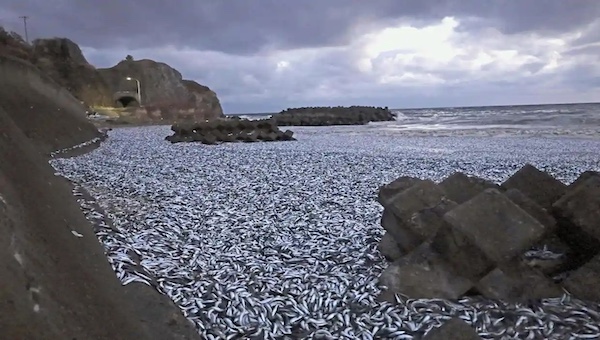
SARDINES & MACKERELS ARE SEEN WASHED UP ON A BEACH IN HAKODATE, HOKKAIDO, NORTHERN JAPAN. PHOTOGRAPH: 瀬尾遊/AP
I’VE NEVER SEEN ANYTHING LIKE THIS’: JAPAN SAYS REASON BEHIND 1,200 TONNES OF FISH WASHING ASHORE IS UNKNOWN
BY: JUSTIN MCCURRYORIGINAL SITE: THE GUARDIAN
Officials in Japan have admitted they are struggling to determine why hundreds of tonnes of fish have washed ashore in recent days.
Earlier this month, an estimated 1,200 tonnes of sardines and mackerel were found floating on the surface of the sea off the fishing port of Hakodate in Hokkaido, forming a silver blanket stretching for more than a kilometre.
On Wednesday, officials in Nakiri, a town on the Pacific coast hundreds of miles south of Hokkaido, were confronted with 30 to 40 tonnes of Japanese scaled sardines, or sappa , which had been observed in the area a couple of days earlier.
Local fishers scrambled to collect the fish, fearing their carcasses would lower the oxygen content of the water as they decompose and damage the marine environment.
“I’ve never seen anything like this before,” a fisher who has worked in the area for 25 years told the Mainichi Shimbun. “It was only around last year that we began to catch sappa in Nakiri. It makes me wonder if the marine ecosystem is changing.”
Experts have speculated that the migratory fish in both areas had become stranded after being chased to the point of exhaustion by amberjack and other predatory fish. Mass mortality events can also occur when there are sudden drops in the water temperature, causing the fish to go into shock, they added.
But no one has been able to confirm the cause. “The cause is unknown at the moment,” Mikine Fujiwara, a local fisheries official, told the newspaper. “We plan to sample the seawater at the site and examine it to uncover the cause.”
Japanese government officials have blasted a report in the British newspaper the Daily Mail that appeared to link the phenomenon to the release of treated water from the Fukushima Daiichi nuclear power plant.
The report noted that dead fish had begun washing ashore almost four months after the plant began discharging the water – which contains small quantities of the radioactive isotope tritium – into the Pacific.
The International Atomic Energy Agency
approved the plan
, stating in a safety review that discharging the water would have “a negligible radiological impact on people and the environment”.
China, which opposed the release and imposed a ban on Japanese seafood, has been
accused of hypocrisy
since its own nuclear plants routinely pump wastewater with higher levels of tritium than that found in Fukushima’s discharge.
“We are concerned about unsubstantiated information,” a Japanese fisheries agency official told the Asahi Shimbun. Images of the fish have been widely shared on social media – many accompanied by Fukushima conspiracy theories. “There have been no abnormalities found in the results of water-monitoring surveys,” the fisheries agency said, referring to the water that has been pumped out of the Fukushima plant so far. “We’re concerned about the proliferation of information that’s not based on scientific evidence.” Fishing cooperatives in Fukushima had warned that the discharge would inflict further damage on the reputation of their seafood. Town officials in Hakodate urged local people not to consume the stranded fish amid reports that some were gathering quantities to sell or eat. “We don’t know for sure under what circumstances these fish were washed up, so I don’t recommend eating them,” Takashi Fujioka, a fisheries researcher said. AWFSM CATEGORIES
Local authorities are urging people not to consume the fish.
Photograph: 瀬尾遊/AP
Activism | AI | Belief | Big Pharma | Conspiracy | Cult | Culture | Deep State | Economy | Education | Entertainment | Environment | Faith | Global | Government | Health | Hi Tech | Leadership | Politics | Prophecy | Science | Security | Social Climate | Universe | War
